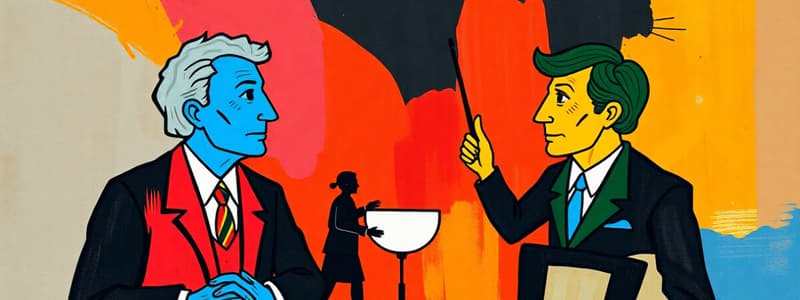Podcast
Questions and Answers
What is defined as a government ruled by a few powerful people?
What is defined as a government ruled by a few powerful people?
- Aristocracy/Oligarchy (correct)
- Anarchy
- Totalitarian Government
- Constitutional Democracy
Which term describes a system where one leader holds absolute power?
Which term describes a system where one leader holds absolute power?
- Humanism
- Magna Carta
- Authoritarian Government (correct)
- Democracy
What principle ensures that no one branch of government has more power than the others?
What principle ensures that no one branch of government has more power than the others?
- Separation of Powers (correct)
- Voter Suppression
- Theocracy
- Fascism
Which term refers to the governmental control by religious leaders?
Which term refers to the governmental control by religious leaders?
What does the term 'liberty' imply in the context of government?
What does the term 'liberty' imply in the context of government?
Flashcards are hidden until you start studying
Study Notes
Sovereignty
- The concept of ultimate power or authority within a state.
Anarchy
- A state of lawlessness and disorder in the absence of government.
Democracy/Republic
- A system of government where power resides in the people, who can choose their leaders through elections.
Aristocracy/Oligarchy
- Forms of government where power is concentrated in the hands of a small, privileged group, be it nobility or a wealthier class.
Authoritarian/Totalitarian Government
- Regimes where a single leader or a small group maintains absolute control over the nation's power and resources, with little or no room for dissent.
Constitutional Democracy
- A system where limitations on government power are clearly outlined and upheld, guaranteeing citizen participation and rights enshrined in a constitution.
Fascism
- A political ideology marked by extreme nationalism, racism, and suppression of all opposition, often under the rule of a dictator.
Theocracy
- A government where religious leaders wield the ultimate power, often interpreting religious law for political governance.
Enlightenment
- An intellectual movement during the 18th century emphasizing reason, scientific inquiry, and individual rights as a means of understanding the world and human society.
Humanism
- A philosophical perspective that places human potential and creativity at the center, stressing faith in human capacity for progress and development.
Secular
- Refers to non-religious concepts or principles, often used in the context of separating religion from government.
Liberty
- The principle of freedom, accompanied by the understanding that individual rights come with responsibilities to one's community and society.
Individual Rights/Civil Rights/Inalienable Rights
- Basic rights and freedoms guaranteed to all citizens, as outlined in documents such as the Bill of Rights, that cannot be infringed upon by the government.
Separation of Powers/System of Checks and Balances
- A system of governance that divides power among different branches - legislative, executive, and judicial - to prevent any single branch from becoming too powerful.
Voter Suppression
- Deliberate attempts by governments to restrict voting access for certain groups, often based on race, ethnicity, or other factors.
Magna Carta
- A historical document from 1215 AD that established fundamental rights and limitations on the power of the English monarchy, serving as a precursor to modern constitutional rights.
Rule of Law
- The principle that everyone, including those in positions of power, is subject to the same laws and legal processes, ensuring fairness and accountability.
Ideology
- A set of beliefs, values, and doctrines that form the foundation of political or economic systems, influencing policy decisions and societal organization.
Revolution
- A dramatic, often violent overthrow of a government or political system, aiming to establish a new form of governance.
Coup d'état
- A sudden, forceful seizure of power usually involving a small group of individuals or a faction within the military, often through a swift, unexpected action.
Studying That Suits You
Use AI to generate personalized quizzes and flashcards to suit your learning preferences.




